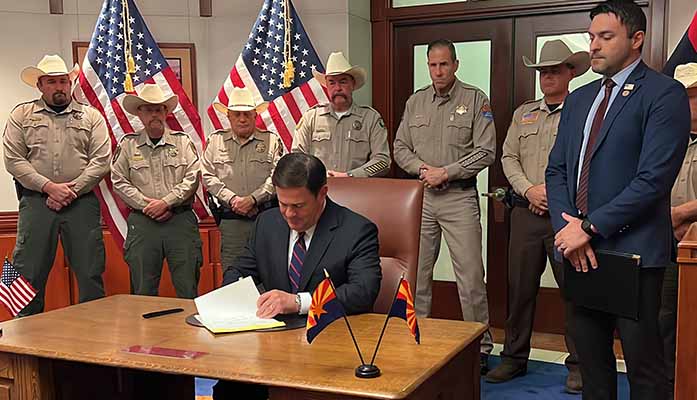
Ducey Signs Bill To Address Human Smuggling, Make Some Crimes Against Kids Prison Mandatory
By Terri Jo Neff |
The sentencing options for several felonies related to child sex abuse, human trafficking, and human smuggling will be significantly restricted in Arizona later this year when new legislation takes effect.
On Thursday, Rep. Leo Biasiucci celebrated the enactment of House Bill 2696 which reforms the state’s sentencing ranges for some of the most horrific crimes against children. It triples the length of prison sentences for some crimes against children under age 15 while prohibiting judges from placing someone on probation instead of in prison for other offenses, including human trafficking and human smuggling.
“I’m proud to have sponsored this important legislation to ensure that anyone convicted of these heinous crimes serves mandatory prison time with no chance of parole,”said Biasiucci, the House Republican Majority Whip. “Iappreciate the strong support of Governor Ducey and my fellow legislators. These new laws will combat these crimes and make Arizona safer for everyone.”
Under HB2696, the sentencing range for the continuous sexual abuse of a child under age 15 changes from 13 to 27 years to 39 to 81 years. And someone who has a prior felony involving various forms of child abuse would have a sentencing range of 69 to 111 years if later convicted of the continuous sexual abuse of someone under age 15.
Judges will also see new restrictions when sentencing a defendant convicted of luring a minor for sexual exploitation if the minor is under age 15, aggravated luring when the minor is under age 15, as well as sexual extortion. Such offenses will become prison mandatory and ineligible for probation, suspension of sentence, pardon, or most early releases from confinement.
Luring involves offering or soliciting sexual conduct with another person knowing or having reason to know that the other person is a minor, while aggravated luring involves the use of an electronic communication device “to transmit at least one visual depiction of material that is harmful to minors for the purpose of initiating or engaging in communication” which offers or solicits sexual conduct with a recipient the sender has reason to believe is a minor.
Although luring and aggravated luring often involve online predators, those crimes are also frequently committed by young adults and teens. In addition, the offense does not require an actual victim who is a minor. A conviction can be obtained on the basis of offers or communications with someone the person have reason to believe is under 15, even if that person is a peace officer.
But HB2696 also targets those involved in criminal activity involving human trafficking and human smuggling. Once effective, the new law will allow prosecutors in the state’s 15 counties as well as the Arizona Attorney General’s Office to charge someone who knowingly or intentionally gets involved in a human smuggling organization or operation.
The bill adds a provision to Arizona Revised Statute 13-2323A making it a crime for someone to knowingly assist a human smuggling organization or operation “by transporting a person, or procuring the transportation for a person” with the intent to conceal the person from a peace officer or to assist the person in fleeing from a peace officer “who is attempting to lawfully arrest or detain” that person.
Several law enforcement officials from across the state attended Thursday’s bill signing by Ducey. During the event, the governor made pointed comments about ongoing border crisis, while praising Biasiucci and the bill’s 32 bipartisan co-sponsors for ensuring anyone who aids illegal human smuggling organizations or operations will be held accountable.
“We’re taking another critical step to fill the void in leadership left by the federal government’s unwillingness to secure the border,” Ducey said. “We have seen a dramatic increase in human smuggling at the border since President Biden took office. I’m hopeful this new law will help to save lives and deter more migrants from making the dangerous journey to our border.”
Biasiucci’s bill was opposed by the Arizona Justice Project, the William E Morris Institute for Justice, and Arizona Attorneys for Criminal Justice. The sentencing requirements do not take effect until later this year and are not retroactive.
Nothing in HB2696 restricts the ability of a governor to commute a sentence in accordance with existing state law.
